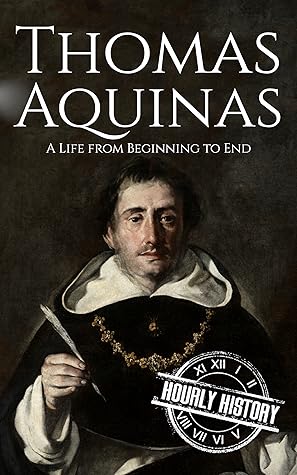More on this book
Kindle Notes & Highlights
Read between
February 20 - February 23, 2024
After taking a vow of chastity and poverty,
Aquinas’s greatest desire was to contemplate God and creation,
this desire for greater understanding of the divine was indeed the driving force behind the life of Thomas Aquinas.
Thomas Aquinas had some not so humble beginnings. He was born in 1225,
all the classic works of the great philosophers, such as Maimonides, Averroes, and Aristotle,
professor who was known as Peter of Ireland.
Peter of Ireland,
Aquinas did indeed come from a rather wealthy family, yet he never used his money for his own luxury;
instead, he could be often seen giving alms to the poor. This was apparently a tradition that began very early in his life.
However this mysterious transmutation of bread to roses may have occurred, his father apparently took it as a miracle and never bothered the youth again about his exuberant giving.
“The things that we love tell us what we are.” —Thomas Aquinas
Saint Francis of Assisi, who had died a year after Thomas was born.
It was allegedly this bright shining halo over Aquinas’s head that led the order to openly defy the threats of Aquinas’s father and allow him to join their ranks.
“To one who has faith, no explanation is necessary. To one without faith, no explanation is possible.” —Thomas Aquinas
The more they sought to pull him back from the Dominicans, the more it pushed him further into their embrace.
It was claimed that the cord was indeed real, and Aquinas would carry an approximation of it for the rest of his life, later attesting that “many miracles were worked by it.”
“To bear with patience wrongs done to oneself is a mark of perfection, but to bear with patience wrongs done to someone else is a mark of actual sin.” —Thomas Aquinas
Saint Albert the Great. Albert was a leading religious scholar in his day and among the first to entertain the writings of the Ancient Greek philosopher Aristotle.
declared of Aquinas, “We have called him the dumb ox, but he will bellow so loud that the sound of his voice will be heard throughout the whole world.”
“Idleness is the hook with which the devil fishes, with which all bait is taken.” —Thomas Aquinas
as well as further studying the works of the ancient Greek philosopher Aristotle.
many Christians of Aquinas’s day had begun to open up to Aristotle, valuing his treatises on logic and reason and framing them within a Christian worldview.
Saint Bonaventure.
In general, this was a time in which the passion of Thomas Aquinas seemed to burn the brightest.
Those graced with his presence were said to have been infused with the “ardour of the love of God which burned in his soul.”
Aquinas and those like him were also roundly criticized for relying too heavily on the philosopher Aristotle,
but humanity had a very special dose of this divinity in the form of the Holy Spirit.
He believed that every human had this essence within them, but not every human had been enlightened to reach inward and tap into it.
the epic Summa contra Gentiles. In this piece, Aquinas sought to build a bridge between Greek and Arab thought that had filtered into Western Europe by framing it into a Christian perspective.
rather than shy away from the advances of non-Christians, they should be incorporated as wayward
divine sparks that need to be brought back under Christian dominion.
“The prayerless soul advances in nothing.” —Thomas Aquinas
The Great Schism between the western and eastern Catholic churches.
The east, largely composed of Greek-speaking peoples, had fallen out with their Latin-based brethren in the west.
They had become known as the Greek Orthodox Faith and were considered heretical by ...
This highlight has been truncated due to consecutive passage length restrictions.
differing beliefs in matters of the Holy Spirit, communion, and the ultimate...
This highlight has been truncated due to consecutive passage length restrictions.
his most famous work, Summa theologiae. Now in his late forties, Thomas Aquinas was in his intellectual prime.
“Better to illuminate than merely to shine, to deliver to others contemplated truths than merely to contemplate.” —Thomas Aquinas
What was remembered more than anything else, however, were Aquinas’s continued, alleged supernatural encounters.
Aquinas finally relented. He informed his faithful secretary that it was none other than the Apostles Paul and Peter who had dropped down from heaven to speak with
him.
What makes this alleged encounter so remarkable is that Aquinas supposedly had this visitation with the spirit of the deceased man before word had reached Naples of his demise.
they were completely shocked at Aquinas’s foreknowledge.
As dedicated as he had been for most of his life, in his later years, Aquinas drew even closer to his faith.
Thomas Aquinas passed away at age 49.
He wasn’t able to complete the immediate mission the pope had given him, but although this one temporal task had not been fulfilled, by the time of his passing he had completed much more than anyone had ever expected.
“Justice is a certain rectitude of mind whereby a man does what he ought to do in the circumstances confronting him.” —Thomas Aquinas


